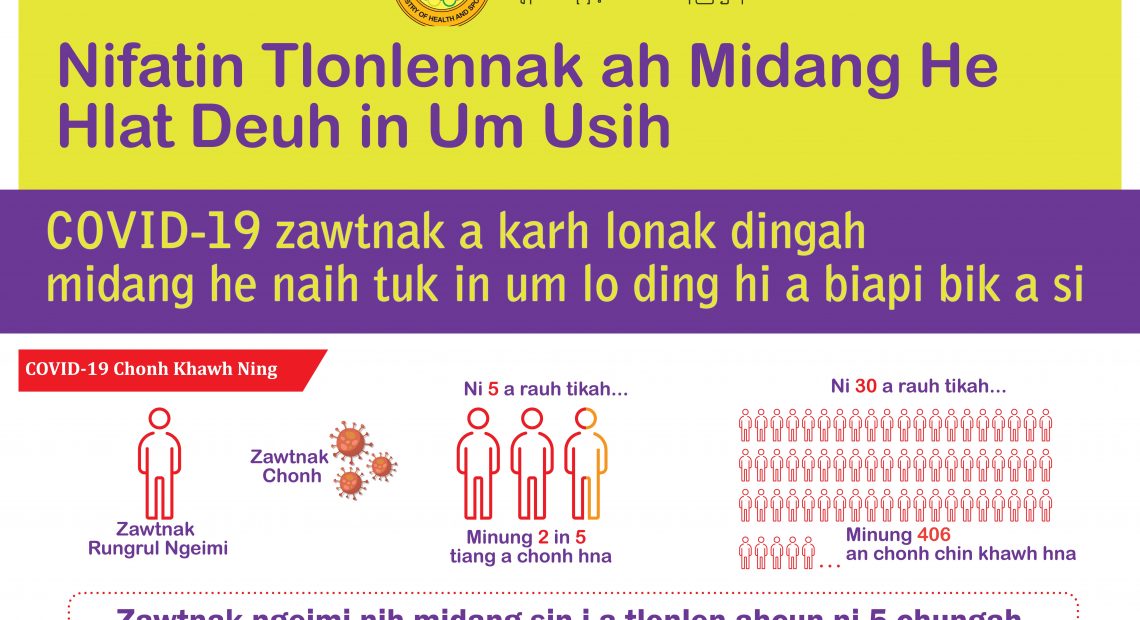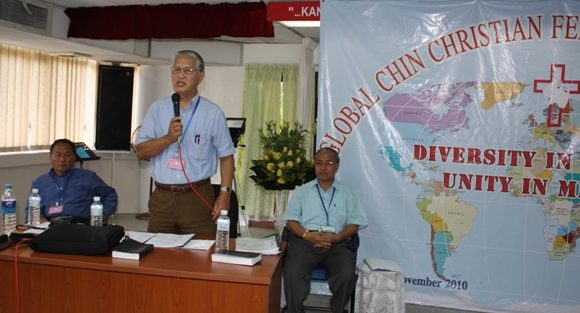Selective enforcement of COVID-19 restrictions

(Photo: Translation into Hakha language by CHRO in collaboration with the Chin State Health Department)
18 November 2020 – The first COVID-19 positive case was confirmed in Myanmar with a Chin US citizen visiting his native village in Chin State in late March 2020. Since then, the authorities have imposed restrictions to curb the spread of the pandemic.
Looking at the nature of its infection, the coronavirus neither gives favour to one over another nor differentiates the rich from the poor. It does not shun anyone – whether you are the leader of a country or a villager in the far corner of the hard-to-reach communities. COVID-19 travels everywhere and to everyone, young and old.
In Hakha, the seat of the Chin State government and the capital of the least developed State in Myanmar, the local authorities also put in place various COVID-19 restrictions including the need to wear masks when going outside, the limits of people gathering at one place and social distancing. People travelling in and out of the town are being monitored and recorded. These have been seen as necessary yet effective measures.
However, some of the actions taken by the authorities, especially in Hakha, in handling issues related to COVID-19 restrictions were seen ‘unfair’ and hence attracted strong criticism. A female private tuition teacher was arrested and detained after an anonymous complaint was made to the local authorities alleging that she was assembling students in her private home. In another incident, a group of family members and friends gathered at a house for night worship service and were raided by the police, who took the house-owner and the Christian pastor into their custody.
By contrast, the authorities didn’t take any action on people holding political rallies and campaign activities in the lead up to the November election. In Hakha, a group of party supporters far exceeding the limits for COVID-19 restrictions marched across the town almost every weekend but these activities went ‘unnoticed’. Similarly, MP candidates organized campaign events in towns and villages without much of safe social distancing practices. However, all of these seemed to be treated as ‘acceptable’ within COVID-19 restrictions guidelines of the Ministry of Health and Sports.
The restrictions, updated depending on the emerging situations, included bans on gathering at churches, weddings and sports centres. Schools and restaurants were closed while government offices were open with employees working in the same building. People were still allowed to go to local markets and bazaars but with limited opening hours. But this also created some crowds.
Banks were open everyday but with preventive measures in place. Before the opening hours in the morning, people got together while waiting for the bank to open, without necessarily following the rules. No action was taken by the responsible authorities.
A small group of six individuals who played badminton two or three times a week at a hall in Hakha also said that the local COVID-19 committee member had reported to the police and that they had to stop the physical activities.
“We heard that a leading committee member of COVID-19 informed the police of our badminton activities. The very same person organized a wedding ceremony and a gathering for a birthday party. It is very unfair,” said Thawng, one of the badminton players.
Contrariwise, other sports places in parts of Hakha were not monitored despite the gathering.
Some returnees from Yangon were kept at quarantine places while others were home-quarantined. For instance, a bed-ridden elderly who was coming back together with family members to Hakha from Yangon after the medical check-up was quarantined at home while the family members who had to take care of the elderly were separated and put in a distant quarantine centre. The particular situation required another family member or relative to look after the patient, posing more risks of infection in reality.
“If they [family] came home together, they could be home-quarantined together and at the same time, the same family members who had taken care of the patient could look after. As they were separated, new family members had to look after the patients. And this is very impractical,” said a Hakha resident, who asked not to be named.
Meanwhile, some village leaders told the Chinland Guardian when asked about the COVID-19 preventive measures taken in their communities that they were just aware of the virus but had not taken any serious preventive measures not only because they didn’t have the means but also they were not reached by the concerned authorities in terms of support and facilities.
Questions were raised on how the restrictive measures were enforced. Did the concerned authorities take action only when a complaint was reported to them? What kind of criteria was used in order to put a suspected person into quarantine or not?
Based on the above-mentioned incidents observed and experienced, some actions taken by the authorities in enforcing the officially announced measures of COVID-19 restriction were seen ‘unfair, controversial and biased’. By Thawng Zel Thang





